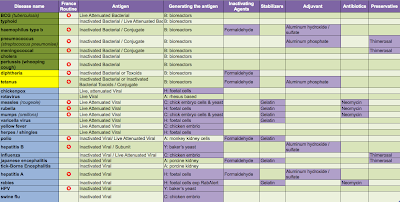In part 1 of this post, I tried to demonstrate that a categorical rejection of vaccines in general is not only socially irresponsible, but does not make sense from a medical point of view. The reason for this is that vaccines (and the diseases that they prevent) are very different in nature. However, if one goes beyond this general argument, certain details of a particular vaccine can still provoke two sorts of individual concerns: medical and ethical. And while most rational people will probably agree that immunization is good for society, one still has to admit that individual freedom of choice based on informed consent remains an issue in vaccination practices in most countries.
I am not going to go into the details of the scientific studies of the impact of certain substances that can cause concern (such as formaldehyde, embryo cells, egg protein, gelatin, thimerosal) for human health. This subject is widely covered elsewhere and is easily accessible. Rather, I would like to focus here on the lack of any routine procedures that could help medical professionals inform in an accessible way about any potential concerns to patients and their parents. Doctors still posses an aura of "sacred knowledge" that is considered inaccessible to patients. This practice perhaps goes back to the times when medical community was closed, and doctors for thousands of years swore the Hippocratic Oath to "not share knowledge outside of the guild". Whatever the origins of this practice are, in modern times the individual should get information about what is happening in his own organism. Such secretive practices are also contra-productive because they can feed conspiracy theories and give arguments to the general anti-vaccine sentiment.
The information given by the medical community should be simple. Personally, as a user of the pediatric services in France, I would generally be satisfied with the following table that I have put together:
The information given by the medical community should be simple. Personally, as a user of the pediatric services in France, I would generally be satisfied with the following table that I have put together:
 |
| Example of Immunisation Information for Patient Consent (France) Represents vaccines approve in EU and USA, for other countries information might be different. |
Whatever my concerns will be after seeing this table, I would want to be able to openly discuss all of them with my doctor. In the absence of real scientific evidence of any harmful nature of the substances that could be of concern, I and probably most parents and patients could accept these vaccines.
As for the ethical concern about the use of human embryos in the production of certain vaccines, most religious leaders (for example the Pope, The Supreme leader of Iran, etc.) have approved the use of vaccines produced using stem cells. Doctors should also be trained to talk about such subjects with patients.
As for the ethical concern about the use of human embryos in the production of certain vaccines, most religious leaders (for example the Pope, The Supreme leader of Iran, etc.) have approved the use of vaccines produced using stem cells. Doctors should also be trained to talk about such subjects with patients.
To summarise, the search for balance between individual freedom and the social good should enter also the realm of medical practice, and informed consent about immunisation should become the part of the routine medical process. Such measure could help not only to reduce the conspiratorial hipe around immunisation, but also indirectly lead to a more responsible individual attitude towards health, as well as the changing the nature of doctor/patient relationships for good.
References:
European Centre for Diseases Prevention and Control http://vaccine-schedule.ecdc.europa.eu/Pages/Scheduler.aspx
European Centre for Diseases Prevention and Control http://vaccine-schedule.ecdc.europa.eu/Pages/Scheduler.aspx
Addressing Parents’ Concerns: Do Vaccines Contain Harmful Preservatives, Adjuvants, Additives, or Residuals? http://pediatrics.aappublications.org/content/112/6/1394.full